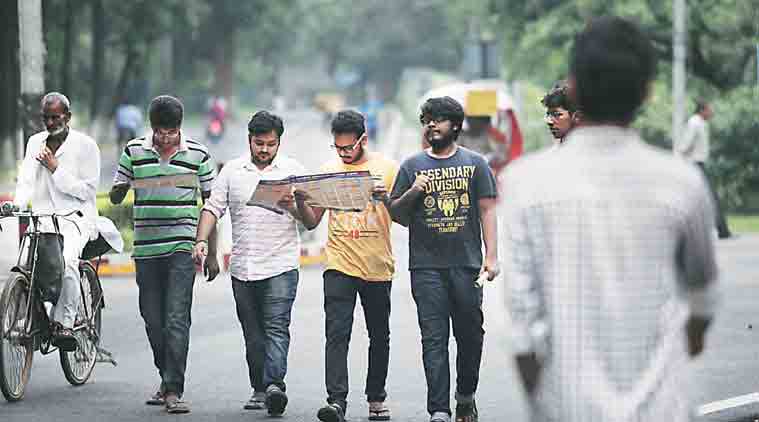Ritika Chopra, an award-winning journalist with over 17 years of experience, serves as the Chief of the National Bureau (Govt) and National Education Editor at The Indian Express in New Delhi. In her current role, she oversees the newspaper's coverage of government policies and education. Ritika closely tracks the Union Government, focusing on the politically sensitive Election Commission of India and the Education Ministry, and has authored investigative stories that have prompted government responses. Ritika joined The Indian Express in 2015. Previously, she was part of the political bureau at The Economic Times, India’s largest financial daily. Her journalism career began in Kolkata, her birthplace, with the Hindustan Times in 2006 as an intern, before moving to Delhi in 2007. Since then, she has been reporting from the capital on politics, education, social sectors, and the Election Commission of India. ... Read More
Too stretched, can’t increase BTech seats, 7 IITs tell HRD Ministry
The older IITs witnessed their biggest hike in B.Tech seats at the time of implementing the 27 per cent OBC reservation.
 In 2008, before the quota was introduced, there were about 4,000 undergraduate seats among these seven institutions. Now, together, they account for close to 6,500 seats.
In 2008, before the quota was introduced, there were about 4,000 undergraduate seats among these seven institutions. Now, together, they account for close to 6,500 seats.
CITING stretched resources — from infrastructure to faculty — the seven older Indian Institutes of Technology (IITs), Bombay, Delhi, Guwahati, Kharagpur, Kanpur, Madras and Roorkee, have not agreed to add more seats to their four-year Bachelor of Technology (B.Tech) programmes as proposed by the government at the IIT Council meeting held on August 23.
In fact, only the second-generation IITs in Hyderabad, Mandi, Ropar, Patna (set up by the UPA government) and IIT Jammu established by NDA II will increase their undergraduate student strength from next year. Currently, there are 23 IITs in the country.
Sources told The Indian Express that IIT Hyderabad, to begin with, will add another 40 seats next year, IIT Mandi will add 50; IIT Patna 25; IIT Ropar 105 seats and IIT Jammu 30 seats.
The older IITs witnessed their biggest hike in B.Tech seats at the time of implementing the 27 per cent OBC reservation. In 2008, before the quota was introduced, there were about 4,000 undergraduate seats among these seven institutions. Now, together, they account for close to 6,500 seats.
READ: President Pranab Mukherjee okays inquiry against AMU V-C Zameeruddin Shah
The IIT Council — the highest decision-making body of the premier engineering schools — had given an in-principle approval to the ministry’s suggestion to increase their student strength from 72,000 to 1 lakh over the next three years until 2020. This, in effect, meant the institutes would collectively aim to add 4,000 B.Tech seats each year until 2020 and 6,000 M.Tech and research seats each year over the next three years. Currently, there are close to 10,000 B.Tech seats among all 23 IITs.
To achieve this, the IITs would have to waive the condition which makes students stay compulsorily on campus. In other words, the institutes will depend on admitting more non-resident students. All the 23 IITs were asked to assess their capacity and resources and come up with a roadmap on how to achieve the overall proposed hike.
As many as 20 of the 23 IITs have sent their feedback to the HRD Ministry this month of which only five are said to have completely agreed with the proposal. None of the seven older IITs is on board as far as increasing undergraduate seats are concerned, said sources. “They are interested in taking in more M.Tech and Ph.D students,” said a source.
“The older IITs have reached their saturation point as far as admitting B.Tech aspirants is concerned. The onus is now on the newer lot to achieve the B.Tech increase suggested by the government,” said a director of one of the seven older IITs who spoke on the condition of anonymity.
Read: IIT-Kharagpur students develop drones for aerial surveillance
“Hostel accommodation for new students cannot be arranged overnight. We have been asked to admit more non-residential students. But this is not possible for some of the institutes which are located in remote locations. How can IIT Guwahati, IIT Kanpur and Kharagpur do this? Finding rented accommodation near these institutes is very difficult. Students stay back late in the laboratories. They need to stay on campus,” said another director of one of the seven older IITs, who also did not wish to be identified.
Poor faculty strength is another reason why IITs have not accepted the government suggestion. While each IIT is supposed to maintain a ratio of one teacher for 10 students, the ratio now is one for 15. There are an estimated 2500 faculty vacancies across the IITs. Of the seven IITs which figured in the top 700 of the QS world rankings this year, six have slipped several places compared to last year. IIT Madras was the only exception which improved its ranking by five places to join the top 250 club.
For more news on education, click here





- 01
- 02
- 03
- 04
- 05



























